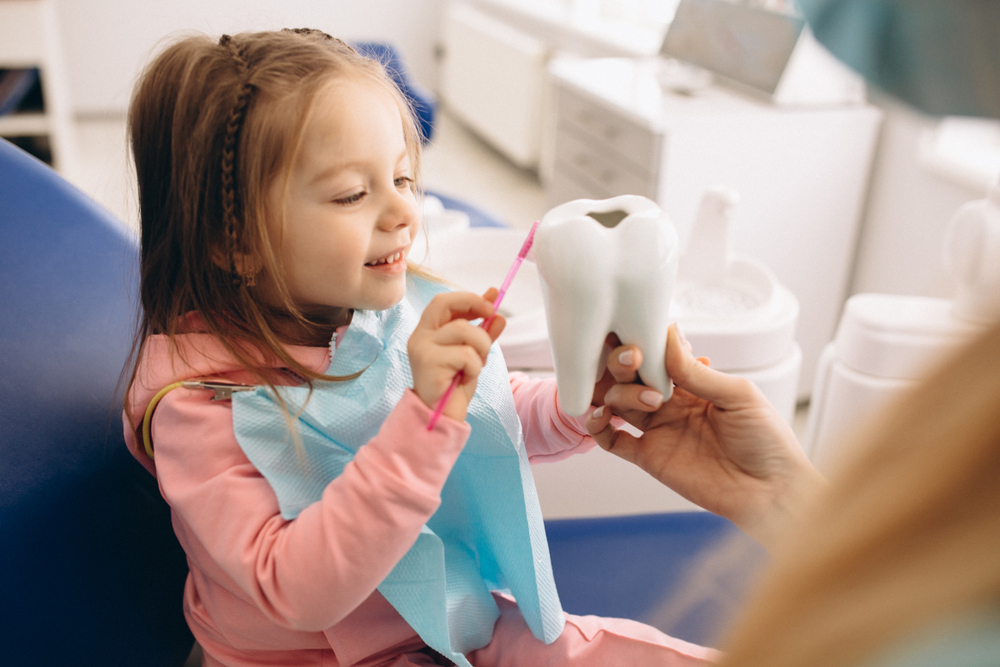Navigating the expanse of oral health for these unique individuals necessitates a soft touch and a thorough grasp of their sensory issues.
Did you know that 5–16% of children globally struggle with sensory processing issues, according to recent studies? Parents, caregivers, and dental professionals need to comprehend how these sensitivities affect dental experiences.
Our pediatric dentist in Apollo Beach is aware of sensory sensitivity, so we can make sure kids with autism have a relaxing visit. We provide customized, focused care that prioritizes dental health while attending to individual needs.
Understanding Sensory Sensitivities
Children with sensory issues often face difficulties adapting to the routine practices of dental hygiene.
Whether it’s the sensation of a toothbrush, the taste of toothpaste, or the unfamiliar sounds and sights of the dental office, these factors can hinder the development of healthy dental habits.
At Smile Lynn Pediatric Dentistry, our team of professionals collaborates with parents to model behaviors that reinforce their child’s dental hygiene, ensuring a positive experience for everyone involved.
Brushing Options Catered to Sensory Needs
For hypersensitive or sensory-seeking children:
- Weighted Vest Comfort: Wearing a weighted vest during tooth brushing can have a calming effect, reducing fidgeting and promoting focus.
- Electric Toothbrush Magic: The use of an electric toothbrush introduces increased stimuli, making brushing an enjoyable experience for some children.
- Melodic Tooth Time: Singing songs to your child while they brush not only adds an element of fun but also ensures that they brush for the recommended amount of time.
- Compact Brush for Quick Movements: Opting for a toothbrush with a small brush size allows for easier, quicker movements around the mouth, ensuring effective cleaning.
For hypersensitive or sensory-avoiding children
- Gentle Introduction: Start by gently rubbing the outside of the mouth with fingers or a warm, wet washcloth to ease into the tooth-brushing routine.
- Gradual Progression: Introduce a dry toothbrush to the gums and teeth, gradually adding a tiny bit of toothpaste as the child becomes more comfortable.
- Child-Controlled Brushing: Allow the child to control the pressure and speed of the toothbrush, empowering them to increase both as they become more at ease.
Dental Appointment Preparation
Preparing your child for a dental appointment involves clear communication and an understanding of their specific needs.
- Informing the Dental Team: Share any medications, anxiety triggers, or concerns your child may have. The more information we have, the better we can adapt the treatment to suit your child’s needs.
- Familiarization Tour: Schedule a tour of our clinic to introduce your child to the environment, reducing anxiety during the first visit.
- Visual Presentation: Use visual aids and a detailed schedule to help your child understand the steps involved in tooth cleaning.
- Open Communication: If your child becomes uncomfortable at any point, let us know. We can schedule another visit to accommodate their needs.
Dental Sedation Options
Recognizing that every child deserves a bright smile, we offer sedation options for those who may benefit from a more relaxed experience:
- Nitrous Oxide: This reversible sedation method helps calm nerves, reduces the gag reflex, and allows children to respond, speak, and listen to their dentist during procedures.
- Oral Conscious Sedation: By relaxing children during dental treatment, this medication enables them to respond and interact without feeling overly alert or afraid.
- General Anesthesia: Ideal for longer procedures or children with behavioural issues, this method ensures comfort for patients who may have trouble sitting still.
Find a pediatric dentist near you offering tailored dental sedation options. Ensure your child’s comfort during procedures with expert care designed for a stress-free and anxiety-free experience.
What are the effects of sensory sensitivity on a child’s dental experience?
For youngsters, sensory sensitivity refers to heightened reactivity to stimuli, which can make ordinary events potentially overwhelming.
Anxiety can be exacerbated in the dental setting by bright lights, loud noises, and strange feelings. Taking a composed attitude becomes crucial, guaranteeing a favorable association with dental hygiene from a young age.
Why is treating sensory sensitivity in dental care so important?
Research suggests that kids who are sensitive to certain stimuli might reject or avoid going to the dentist, which could result in problems with their oral health.
A lifetime commitment to dental care, however, is fostered by early favourable experiences. Establishing a comforting atmosphere is an investment in your long-term dental health, not just a quick fix.
Elevating Smiles at Smile Lynn Pediatric Dentistry
At Smile Lynn Pediatric Dentistry, we take pride in nurturing bright and healthy smiles in a warm, child-friendly environment.
Our tailored approach ensures each child receives personalized, compassionate care, embracing diverse needs with expertise.
Trust us to make dental visits enjoyable and stress-free for your little ones.
Schedule an appointment with us today because every child deserves the best in pediatric dental care.
